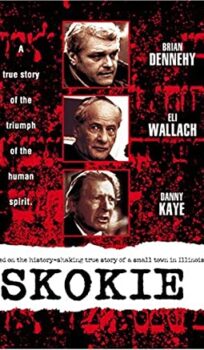Skokie(1981)
Submitted by Steve
Danny Kaye’s final movie role
POOPER:
The Illinois Supreme Court rules that the swastika is protected by free speech, allowing the Nazis to march in Skokie. When the US Supreme Court refuses to hear the case, the city knows they lost. But on the eve of the march, the Nazis cancel it. They never intended to march in Skokie at all. They just wanted national attention and to cause grief at the expense of the Jews, and they got it.
LONG VERSION:
In 1977, the Chicago suburb of Skokie (rhymes with smoky) has a population that is over 40% Jewish, with many of those Jews either concentration camp survivors or relatives of people who died in one of them. This normally quiet town is shocked to learn that the Chicago chapter of the National Socialist Party (the Nazis), led by Frank Collin (George Dzundza), have chosen Skokie as the site of their annual parade and rally on May 1. Not surprisingly, nobody in Skokie wants this to happen, and the Jewish community meets to determine how to fight this. Some Jewish business leaders, like Bert Silverman (Eli Wallach) and Abbot Rosen (Carl Reiner) say they should close down the town that day and ignore them. The Nazis want the attention and to get a rise out of the Jews, but if they don’t show up, the Nazis won’t have anyone or anything to rally against. But Skokie resident Max Feldman (Danny Kaye), who is a Holocaust survivor, refuses to ignore them. He says the last time he was told to ignore the Nazis, he ended up in a concentration camp. He will fight this, and his words convince others to join him.
As word gets out that some Jews intend to fight back, other groups, such as the Communists and other militant Jews, plan on coming to Skokie to fight the Nazis too, much to the chagrin of Skokie’s mayor Albert Smith (Ed Flanders) and chief of police Arthur Buchanan (Brian Dennehy). Ultimately, the city decides to sue the Nazis to keep them from marching on their streets. They file several injunctions that would prevent the Nazis from wearing their uniforms and passing out material that contains hate speech. In response, Collin hires Herb Lewisohn (John Rubenstein), a Jewish lawyer, of the ACLU to defend them. They claim that the city’s prevention of them to hold their parade and rally is a violation of their right of free speech and free assembly. At first, the ACLU is reluctant to take the case, since many of their board members are Jewish, but Lewisohn makes the argument to his boss that everyone, even the Nazis, have rights, and the city of Skokie is violating them.
Meanwhile, Feldman’s 16-year-old daughter Janet (Marin Kanter) wants to know why everyone hates the Nazis. Since her mother Bertha (Kim Hunter) won’t talk about it to her because she thinks she’s too young to understand, Max sits her down and tells her the entire story of how his family was rounded up and sent to concentration camps solely because they were Jewish. He tells her about each person in his family, from who they were to what they did for a living, and what happened to them. He admits that he still doesn’t know what happened to some of them. He even shows her the number tattooed on his arm. Afterward, Janet thanks him for finally telling her the truth and promises to support him against the Nazis. But as time goes on, Janet begins to feel like she’s losing her father because he only cares about fighting the Nazis and the attention he is getting from the media, and is now ignoring her and Mom. Max, seeing his daughter in tears after they have a fight, apologizes to her. He doesn’t care about the media attention he’s getting; he and her mother just wanted to protect her from what they went through as children and failed. This is why he’s fighting the Nazis. He also tells her that he will try to be a better father and husband.
The case is heard in a county court, and the city wins. But after the ACLU announces they will appeal the verdict, many Jewish supporters quit the group. One now-former senior member even scolds Lewisohn for turning his back on his heritage by supporting these hoodlums. Despite losing those supporters, the ACLU follows through with their appeal, and they eventually succeed in defeating the injunctions and the Nazis win their right to march. However, the Illinois Appellate Court, who sided with the Nazis, ruled that the swastika is not protected under free speech, so they cannot show that symbol on their flags or uniforms. Collin decides this isn’t good enough, and has Lewisohn appeal the decision to the Illinois Supreme Court. That court overrules the Appellate Court by voting that the swastika is protected by free speech, and that decision is later backed by the 7th Circuit Court of Appeals. The city tries to appeal that decision to the US Supreme Court, but when they vote not to hear the case, they know their year-long battle to prevent the march is over and they lost. The Nazis have even set a new date for their march: April 20, Hitler’s birthday.
But on the eve of the march, Collin cancels it and moves the rally to Chicago. The Nazis never intended to march in Skokie at all. They just wanted the national attention and to cause grief at the expense of the Jews, and they got it. The movie ends with a series of monologues from the various characters. Collin says the Nazis won because people are starting to agree with their views again, and having a court of law say they can say whatever they want proves it. Lewisohn says the ACLU won because they showed that everyone, even those who we disagree with, have the right to free speech. However, he personally lost because many of his Jewish friends and family won’t talk to him anymore. Feldman says the Jews won because the world got to see them finally stand up to the Nazis, and they will never be able to push around the Jews anymore. But, he does admit that he did enjoy the attention he got from the media.

